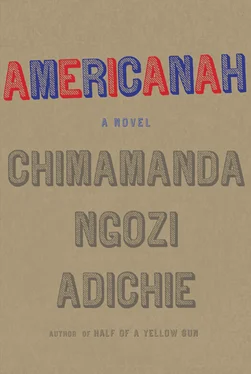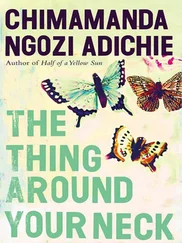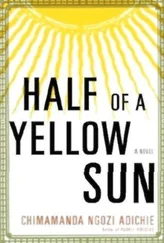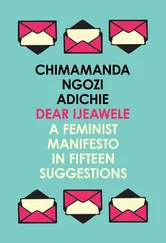She said the word “fat” slowly, funneling it back and forward, and thought about all the other things she had learned not to say aloud in America. She was fat. She was not curvy or big-boned; she was fat, it was the only word that felt true. And she had ignored, too, the cement in her soul. Her blog was doing well, with thousands of unique visitors each month, and she was earning good speaking fees, and she had a fellowship at Princeton and a relationship with Blaine—“You are the absolute love of my life,” he’d written in her last birthday card — and yet there was cement in her soul. It had been there for a while, an early morning disease of fatigue, a bleakness and borderlessness. It brought with it amorphous longings, shapeless desires, brief imaginary glints of other lives she could be living, that over the months melded into a piercing homesickness. She scoured Nigerian websites, Nigerian profiles on Facebook, Nigerian blogs, and each click brought yet another story of a young person who had recently moved back home, clothed in American or British degrees, to start an investment company, a music production business, a fashion label, a magazine, a fast-food franchise. She looked at photographs of these men and women and felt the dull ache of loss, as though they had prised open her hand and taken something of hers. They were living her life. Nigeria became where she was supposed to be, the only place she could sink her roots in without the constant urge to tug them out and shake off the soil. And, of course, there was also Obinze. Her first love, her first lover, the only person with whom she had never felt the need to explain herself. He was now a husband and father, and they had not been in touch in years, yet she could not pretend that he was not a part of her homesickness, or that she did not often think of him, sifting through their past, looking for portents of what she could not name.
The rude stranger in the supermarket — who knew what problems he was wrestling with, haggard and thin-lipped as he was — had intended to offend her but had instead prodded her awake.
She began to plan and to dream, to apply for jobs in Lagos. She did not tell Blaine at first, because she wanted to finish her fellowship at Princeton, and then after her fellowship ended, she did not tell him because she wanted to give herself time to be sure. But as the weeks passed, she knew she would never be sure. So she told him that she was moving back home, and she added, “I have to,” knowing he would hear in her words the sound of an ending.
“Why?” Blaine asked, almost automatically, stunned by her announcement. There they were, in his living room in New Haven, awash in soft jazz and daylight, and she looked at him, her good, bewildered man, and felt the day take on a sad, epic quality. They had lived together for three years, three years free of crease, like a smoothly ironed sheet, until their only fight, months ago, when Blaine’s eyes froze with blame and he refused to speak to her. But they had survived that fight, mostly because of Barack Obama, bonding anew over their shared passion. On election night, before Blaine kissed her, his face wet with tears, he held her tightly as though Obama’s victory was also their personal victory. And now here she was telling him it was over. “Why?” he asked. He taught ideas of nuance and complexity in his classes and yet he was asking her for a single reason, the cause . But she had not had a bold epiphany and there was no cause; it was simply that layer after layer of discontent had settled in her, and formed a mass that now propelled her. She did not tell him this, because it would hurt him to know she had felt that way for a while, that her relationship with him was like being content in a house but always sitting by the window and looking out.
“Take the plant,” he said to her, on the last day she saw him, when she was packing the clothes she kept in his apartment. He looked defeated, standing slump-shouldered in the kitchen. It was his houseplant, hopeful green leaves rising from three bamboo stems, and when she took it, a sudden crushing loneliness lanced through her and stayed with her for weeks. Sometimes, she still felt it. How was it possible to miss something you no longer wanted? Blaine needed what she was unable to give and she needed what he was unable to give, and she grieved this, the loss of what could have been.
So here she was, on a day filled with the opulence of summer, about to braid her hair for the journey home. Sticky heat sat on her skin. There were people thrice her size on the Trenton platform and she looked admiringly at one of them, a woman in a very short skirt. She thought nothing of slender legs shown off in miniskirts — it was safe and easy, after all, to display legs of which the world approved — but the fat woman’s act was about the quiet conviction that one shared only with oneself, a sense of rightness that others failed to see. Her decision to move back was similar; whenever she felt besieged by doubts, she would think of herself as standing valiantly alone, as almost heroic, so as to squash her uncertainty. The fat woman was co-coordinating a group of teenagers who looked sixteen and seventeen years old. They crowded around, a summer program advertised on the front and back of their yellow T-shirts, laughing and talking. They reminded Ifemelu of her cousin Dike. One of the boys, dark and tall, with the leanly muscled build of an athlete, looked just like Dike. Not that Dike would ever wear those shoes that looked like espadrilles. Weak kicks, he would call them. It was a new one; he first used it a few days ago when he told her about going shopping with Aunty Uju. “Mom wanted to buy me these crazy shoes. Come on, Coz, you know I can’t wear weak kicks!”
Ifemelu joined the taxi line outside the station. She hoped her driver would not be a Nigerian, because he, once he heard her accent, would either be aggressively eager to tell her that he had a master’s degree, the taxi was a second job, and his daughter was on the dean’s list at Rutgers; or he would drive in sullen silence, giving her change and ignoring her “thank you,” all the time nursing humiliation, that this fellow Nigerian, a small girl at that, who perhaps was a nurse or an accountant or even a doctor, was looking down on him. Nigerian taxi drivers in America were all convinced that they really were not taxi drivers. She was next in line. Her taxi driver was black and middle-aged. She opened the door and glanced at the back of the driver’s seat. Mervin Smith . Not Nigerian, but you could never be too sure. Nigerians took on all sorts of names here. Even she had once been somebody else.
“How you doing?” the man asked.
She could tell right away, with relief, that his accent was Caribbean.
“I’m very well. Thank you.” She gave him the address of Mariama African Hair Braiding. It was her first time at this salon — her regular one was closed because the owner had gone back to Côte d’Ivoire to get married — but it would look, she was sure, like all the other African hair braiding salons she had known: they were in the part of the city that had graffiti, dank buildings, and no white people, they displayed bright signboards with names like Aisha and Fatima African Hair Braiding, they had radiators that were too hot in the winter and air conditioners that did not cool in the summer, and they were full of Francophone West African women braiders, one of whom would be the owner and speak the best English and answer the phone and be deferred to by the others. Often, there was a baby tied to someone’s back with a piece of cloth. Or a toddler asleep on a wrapper spread over a battered sofa. Sometimes, older children stopped by. The conversations were loud and swift, in French or Wolof or Malinke, and when they spoke English to customers, it was broken, curious, as though they had not quite eased into the language itself before taking on a slangy Americanism. Words came out half-completed. Once a Guinean braider in Philadelphia had told Ifemelu, “Amma like, Oh Gad, Az someh.” It took many repetitions for Ifemelu to understand that the woman was saying, “I’m like, Oh God, I was so mad.”
Читать дальше












